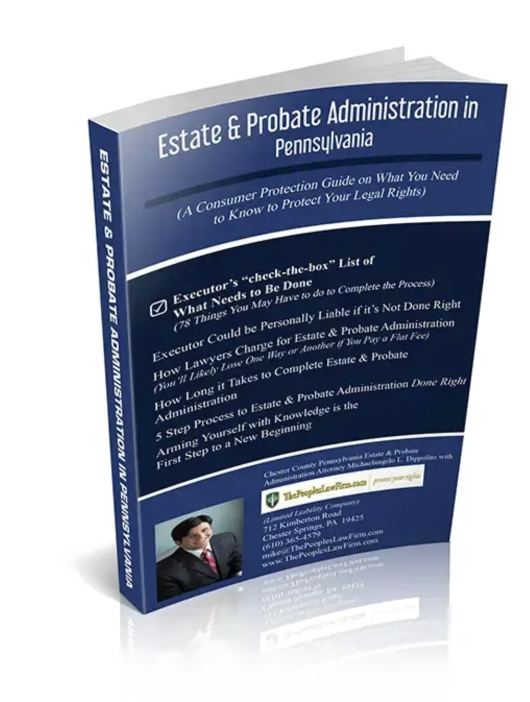After a loved one’s death, those left behind spend time saying goodbye and focusing on their grief. Unfortunately, a death also requires timely legal action to ensure that the loved one’s remaining estate is distributed the way they wished and specified in their will, or the way the state requires if they left no will or estate plan.
If a family member names you as their personal representative, you become the probate administrator after their death. Fortunately, you don’t have to take on this complex legal process alone.
Call ThePeoplesLawFirm.com to speak to a Pennsylvania probate attorney with years of experience in Pennsylvania estate law.
Why Choose ThePeoplesLawFirm.com For Your Estate Administration Case In East Nottingham?
Attorney Michaelangelo L. Dippolito has over 25 years of experience and an in-depth knowledge of Pennsylvania’s estate laws. Representation by ThePeoplesLawFirm.com brings the following advantages to your probate case:
- A personalized strategy for the most efficient probate process based on the unique requirements of your loved one’s estate
- A commitment to professional excellence that puts a steadfast ally at your side throughout the process
- Extensive legal knowledge and resources to ensure the smooth, efficient transfer of your loved one’s assets
Whether your deceased loved one’s estate includes only a single home property and personal momentos, or it’s an estate with high-value assets and a diverse portfolio of holdings, they deserve a process that adheres to their last wishes.
Who Can Administer an Estate In Pennsylvania?
When an individual creates a well-executed estate plan or drafts a will with the assistance of their estate lawyer, they name a trusted person as their personal representative. This is sometimes called the executor, agent, or trustee. Regardless of the terminology used in the will, this trusted individual becomes the estate administrator after the death.
For those who die without a will, the court appoints a close family member as the probate administrator. In most cases, a family member, such as a spouse, adult child, parent, or sibling, steps forward to become the administrator, and the court agrees.
How Does the Probate Process Work In East Nottingham?
Most people dread the probate process, viewing it as the state’s method of withholding valuable assets from beneficiaries for what may appear to be an unreasonable period of time. In reality, a significant amount of action occurs during the probate process.
For the estate administrator, facing probate can be a daunting task. The process requires the following actions:
- First, the estate administrator must obtain a certified copy of the death certificate and file the will with the Register of Wills within the decedent’s home county
- Then, the estate administrator opens the probate case by filing a petition with the county’s probate court (known as the Orphans’ Court)
- The probate court charges a fee based on the overall assessed value of the estate
- The court grants the estate administrator authority through “Letters Testamentary” or for a personal representative named by the court due to an estate without a will, “Letters of Administration,” which grants the representative authority to manage the estate
- The administrator must inform all beneficiaries named in the will, as well as creditors, tax agencies, and the public (typically through a newspaper post in order to allow any unknown creditors to come forward)
- The probate administrator then conducts an inventory of the estate, listing all assets, debts, and tax obligations
- The probate administrator is responsible for paying debts and taxes from the estate, according to the directions specified in the will and/or by selling property from the estate if required
- Throughout the probate process, the estate administrator must periodically update the status of the probate with the court
- Finally, after paying debts and taxes, the estate administrator distributes all remaining assets and personal property according to the terms of the will or the state’s intestacy laws if there was no will
This process can take anywhere from 9 to 18 months, depending on the complexity and value of the estate. Probate may become prolonged if conflicts arise.
What If I Make a Mistake During the Probate Process In East Nottingham?
The probate administrator of an estate is responsible for all aspects of the estate distribution. This responsibility leaves them liable for any deficits to beneficiaries, creditors, or the IRS. Any deficits may have to be paid out of pocket, even if the deficit is the result of an oversight or error.
For this reason, obtaining legal counsel to ensure that every step of the probate process proceeds according to the legal requirements is essential, especially in challenging cases or large estates with diverse holdings and multiple beneficiaries.
Do All Estate Holdings Have to Go Through the Probate Process?
Any estate valued at over $50,000 or with real estate property must go through the probate process. If a Pennsylvania estate includes no real estate property and has a total value of less than $50,000, the estate administrator may use the Small Estate Probate process rather than the typical probate process.
This process requires submitting an affidavit with the inventoried property to the probate court, which then allows the administrator to distribute the remainder of the estate directly to the beneficiaries after paying debts and taxes.
Some other types of funds may bypass the probate process in Pennsylvania. For instance, assets held in a living trust are distributed directly to the beneficiary, as are life insurance benefits.
In many cases, a decedent’s bank accounts have a pay-on-death (POD) or transfer-on-death (TOD) designation. This allows the designated individual—typically the personal representative—to access the funds held in the account immediately upon presenting the bank with the death certificate, thereby bypassing the probate process.
Finally, a spouse or the closest surviving relative of an employed decedent may claim any wages and death benefits up to $10,000 from the decedent’s employer without the probate process.
Contact ThePeoplesLawFirm.com About Your Estate Administration and Probate Case In East Nottingham
After a loved one’s death, you deserve a chance to mourn the loss and focus on your family without the anxiety and stress of taking on a challenging legal process alone, especially when an unintentional error can leave you liable to any wronged beneficiaries, creditors, or tax agency.
Instead, contact Michaelangelo L. Dippolito at ThePeoplesLawFirm.com for experienced legal guidance throughout every step of the probate process. This helps ensure that your loved one’s wishes are carried out as promptly and efficiently as possible so you and your family can move forward.





